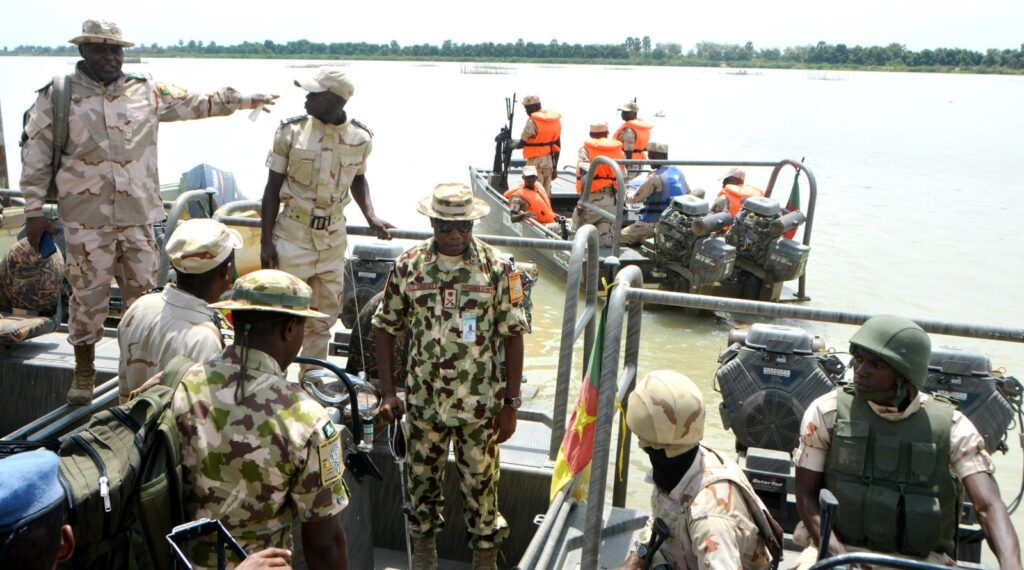ADF STAFF
Troop morale was high when the Multinational Joint Task Force launched Operation Lake Sanity 2 on April 23 and immediately began making headway against the violent extremist organizations that have terrorized the region for years.
A video released by the Nigerian Army in May showed as much with troops in Borno State chanting, dancing and marching with their rifles held aloft after a successful mission that led to the surrender of 47 people associated with Boko Haram and the Islamic State West Africa Province (ISWAP).
When Lake Sanity 2 concluded in early August, the task force, also known as the MNJTF, announced that it had “further degraded” the two insurgent groups from locations around Lake Chad.
“Our dedicated troops have been relentless in their efforts,” Nigerian Maj. Gen. Ibrahim Sallau Ali, commander of the MNJTF, said during a June 11 briefing. “Operation Lake Sanity 2 has achieved substantial successes. We have recorded the surrender of 176 terrorists and the arrest of 57 individuals involved in terrorist activities. During these operations, we recovered a notable cache of armaments … alongside various other arms, ammunition and logistics support items.
“Aerial operations conducted by national air forces from Chad, Nigeria and Cameroon have led to the destruction of crucial terrorist logistic bases and staging areas.”
Weeks later, 263 Boko Haram fighters, associates and family members surrendered in waves between task force operations from July 10 to 17. All were identified as Nigerians and handed over to the troops of the Nigerian Army’s Operation Hadin Kai, which is based in the country’s terror-ridden northeast Borno State.
Alhaji Sarjoh Bah, director of Conflict Management Directorate of the African Union Commission, praised the results of Operation Lake Sanity 2 during a Joint Steering Committee meeting on August 6 and 7 in N’Djamena, Chad.
“Defeating terrorism in the Lake Chad Basin will bring us closer to our collective efforts at Silencing the Guns in Africa,” he said. “Lessons and best practices from the Lake Chad Basin will be applied to other conflict zones on the continent, especially but not limited to the Sahel region. “Implementation of the Regional Stabilization Strategy of the Lake Chad Basin provides useful lessons on the need to balance kinetic and non-kinetic operations.”
Lake Sanity 2 took a combined approach, mixing civil outreach efforts with military operations.
One event, a seven-day medical awareness program, brought free consultations and medicines to several communities in northern Cameroon. The task force on July 2 reported that it “generated a massive response from the local population.”
Analysts agreed that Operation Lake Sanity 2 was successfully targeted Boko Haram and ISWAP hideouts in the region’s islands, swamps and forests. But the terrorist groups have proved they are resilient and highly adaptive.
Remadji Hoinathy, a researcher who focuses on Central Africa and the Lake Chad Basin for the South Africa-based Institute for Security Studies, said the ripple effects of the operation necessitate that the MNJTF anticipate the terrorists’ next moves.
“[Lake Sanity 2’s] successes led to the dispersal of fighters to peripheral areas, where they began attacking civilians,” he wrote in a September 16 article. “There are reports of communities being harassed and an increased use of IEDs (improvised explosive devices) and suicide bombers.
“Boko Haram’s use of IEDs and suicide attacks propagates fear and disrupts both community cohesion and military efforts. These tactics must be tackled head-on to prevent a resurgence and return of the terrorist factions.”
MNJTF Chief Public Information Officer Abubakar Abdullahi highlighted Operation Lake Sanity 2 as a major step toward brining stability to the region.
“The strides made by the MNJTF in restoring stability are but the first steps on the long road to comprehensive recovery and development,” he said in a May 6 statement. “The future of the Lake Chad Basin hinges on the continuation of these concerted efforts to ensure that this vital region can fully realize its potential as a cradle of prosperity and peace.”

